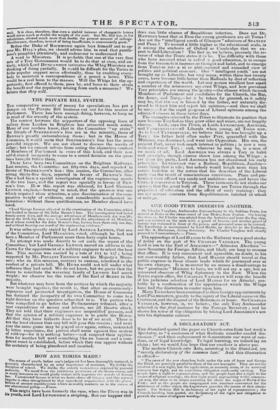THE PRIVATE BILL SYSTEM.
THE comparative scarcity of money for speculations has put a damper on the Private Bill business cut out for this session of Parliament. There has been enough doing, however, to keep us in mind of the atrocity of the system.
The contest between the supporters of the opposing lines of railway from London to Brighton has attracted much notice. Many of our readers know, that in the Committee " up stairs"
the friends of STEPHENSON'S line are in the minority, those of RENNIE'S greatly outnumbering them ; but in the House of Commons, it would seem that STEPHENSON'S line has the more
powerful support. We are not about to discuss the merits of either; but we cannot refrain from noting the shameless conduct
of Members of Par lament in cases of this kind, and their now self-declared incapacity to come to a sound decision on the tines- tious brought nefore them.
There have been two Committees on the Brighton Railways. Last session, the Committee sat fifty-two days, and reported in favour of STEPHENSON'S line : this session, the Committee, after sitting thirty-live days, reported in favour of RENNIE'S line. Thme had been a special hivestigation of the engineering merits of the two lines, and the report was specially in favour of_ Ren- nie's line. Hew this report was obtained, let Lord GEORGE LENNOX explain,—bearing in mind, that the question was one which required close attention, a nice discrimination of the com- parative weight of evidence, and considerable mechanical in- formation: without these qualifications, no Member should have voted.
"Lord George Lennox objected to the constitution of the Committee which had decided in favour of Sir John Rennie's line. The investigation had lasted twenty-seven days, and the average attendance of Members each day was 20; baton the 28th day they were honoured with the attendance of 45 Members, six of whom voted for Sir John liennie's line, haying been there only oue day, arid without hearing one word of the engineering evidence."
It was subst quently stated by Lord ARTHUR LENNOX, that one of the Committee, Lord Msi.nunn, voted, although he had not been a Member of Parliament more than forty-eight hours.
No attempt was made directly to set aside the report of the Committee; but Lord GEORGE Lesinox moved an address to the
Crown for the appointment of a military engineer to select the best
line. This motion was carried by a vote of 164 to 157 ; being supported by Mr. POULETT THOMSON and his Majesty's Minis-
Lees; who on this occasion, contrary to custom, interfered in the
conduct of a private bill. Mr. Huns could not tell under what influence they had acted. We do not know, but we guess that the desire to conciliate the wavering family of LENNOX had much weight: we observe too the name of the Earl of SURRY in the majority.
But whatever may have been the motives by which the majority were brought together, the result is, that after an enormously- expensive and protracted investigation, the House of Commons has declared the incapacity of its own Committee to come to a right decision on the question submitted to it. The parties who were compelled to go before the Parliamentary tribunal, after a vast expenditure of money and labour, are all thrown aback. They are told that their engineers are unqualified persons, and that the opinion of a military engineer is to guide the House. All that they have hitherto done is to be of no avail. There is
not the least chance that any bill will pass this session ; and next year the same game may be played over again, unless, instructed by bitter experience, the parties shall unite against this system of robbrry—for it is nothing better—aud suspend their applica- tions fur another bill until something like an honest and a com- petent court is established, before which they can appear without the certainty of being plundered and insulted.


























 Previous page
Previous page